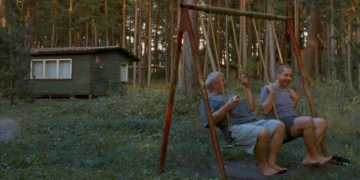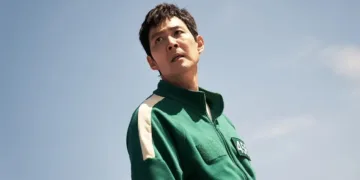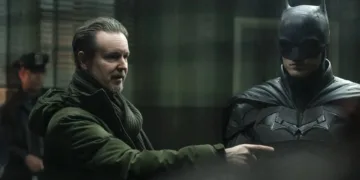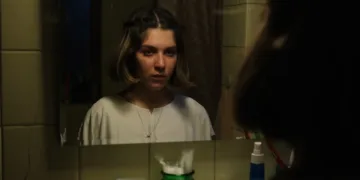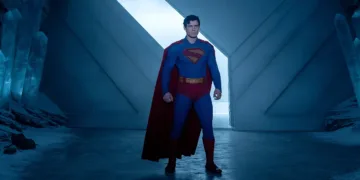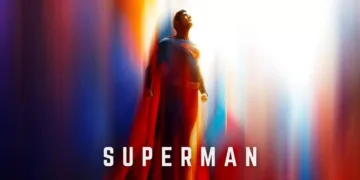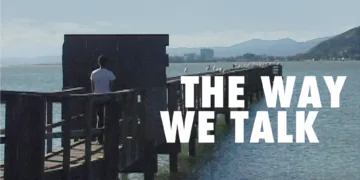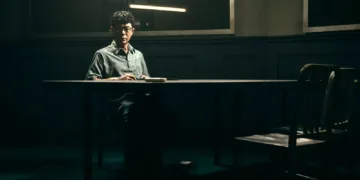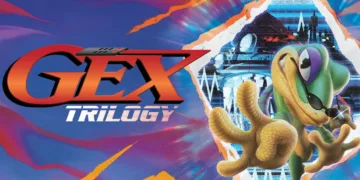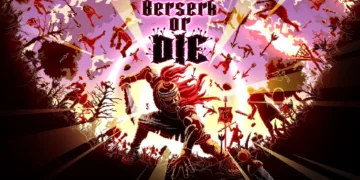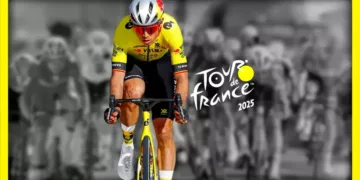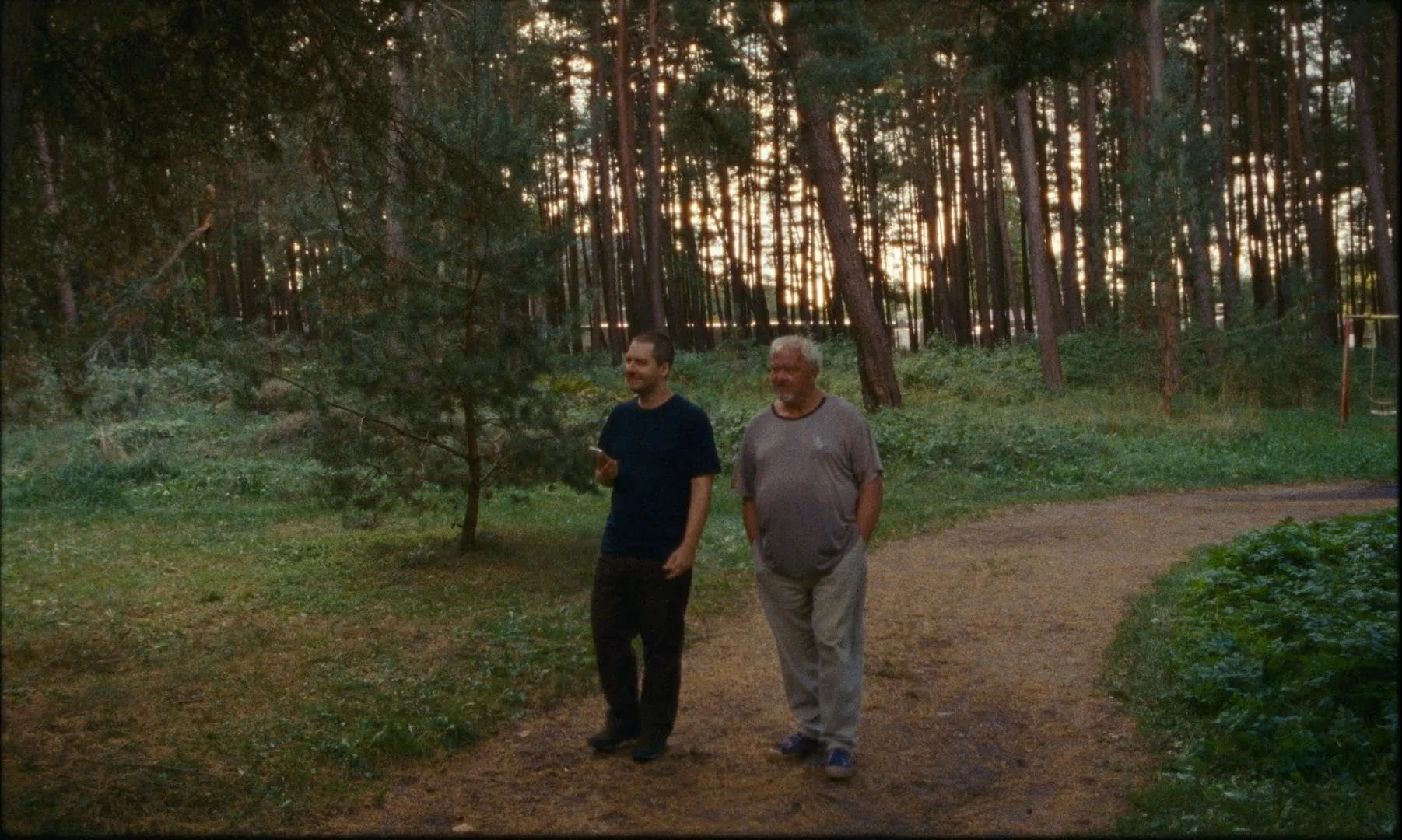There is a profound violence in returning. Not in the act itself, but in the quiet confrontation that follows—the realization that the landscape of one’s youth, a geography once mapped onto the soul, has forgotten your name.
This is the liminal space where The Visitor dwells. We are introduced to Danielius, a man who has manufactured a new existence in Norway with a wife and child, only to be pulled back into the gravitational field of his Lithuanian hometown. He arrives alone, tasked with the starkly practical mission of selling his deceased father’s apartment.
Yet this simple transaction is a deception. His true purpose is an unwilling pilgrimage into the past, a confrontation with a void where a life used to be. From his first moments, a palpable dislocation sets in. He is a phantom moving through the architecture of his own memories, a man caught between two versions of himself, belonging to neither.
An Unblinking, Distant Gaze
The film’s eye is not a welcoming one; it is a cool, dispassionate observer. Director Vytautas Katkus, serving as his own cinematographer, renders this world on 16mm film, and the effect is less nostalgic than forensic. The image possesses a tangible grain, the physical texture of a memory already degrading, its edges fraying.
This is not the clean, crisp recall of digital precision; it is the imperfect, decaying substance of recollection itself. This analogue quality imbues the natural world—the whispering woods, the pale Baltic coast—with the weight of permanence, a stark contrast to the fleeting human figures within it.
The camera maintains a resolute distance, favoring medium and wide compositions that actively refuse the comfort and empathy of a close-up. Conventional cinema begs for intimacy; this film enforces a kind of existential quarantine.
We are not invited into Danielius’s inner world but are made to watch him from afar, a specimen in his own former habitat. His placement within the frame is often deliberately awkward, a man pushed to the periphery of a scene he should command, or viewed through the murky plastic of a seaside windbreak. He is an obstruction in the landscape of his own past, no longer the subject of his story, merely an object within it.
An Itinerary of Inertia
The film rejects the forward momentum of plot for the circular drift of a mind untethered. This is not storytelling; it is a study in stasis. The narrative is a mosaic of fragments, a collection of disconnected moments that refuse to build toward any catharsis. Danielius exists in a state of profound passivity, his will seemingly dissolved by the thick atmosphere of his hometown.
His journey is an anti-quest, an unbecoming. We watch him trail a neighbor’s father with the blankness of a man with no destination, his large frame hovering awkwardly at the edge of conversations he cannot penetrate. In one sequence, he willingly submits his agency to an enormous dog, allowing the animal to drag him through the familiar woods—a perfect metaphor for his surrender.
His physicality speaks to this internal collapse; he is a body moving without purpose, an automaton going through the motions of a life that is no longer his. The film grants strange significance to the smallest events: the grating electronic screech of a musical doorbell becomes an auditory assault, a familiar sound now rendered hostile.
These moments are the debris of a former life, sharp-edged fragments that no longer form a coherent whole. The rare, stylized breaks from this naturalism—a conversation that is suddenly sung, a fantastical dance on a desolate beach—feel like spasms from a psyche pushed to its edge, brief, convulsive tears in the fabric of a crushing reality.
An Architecture of Echoes
The soundscape of this place conspires in Danielius’s erasure. The sonic architecture is dominated not by human speech but by the elemental chorus of the non-human world. The ceaseless sigh of the wind through the pines and the cold drone of the Baltic Sea rise in the mix, an active presence that suffocates intimacy and renders dialogue secondary.
The sound design mirrors his internal state: he cannot hear or be heard above the hum of the world he left behind, a world whose language he no longer speaks. What is unspoken is just as potent. The silences between characters are vast, filled with the weight of years and the ghosts of feelings that can no longer be named.
In a final, chilling detail that solidifies his vanishment, we notice that other characters almost never speak his name. This linguistic erasure is the last stage of his transformation from a person into a visitor. A name anchors an identity; without it, he is a generic figure, a ghost without a title.
The film leaves us with this haunting sensation—that all that remains of a life is the physical space that contained it, an unfeeling witness that holds the echoes of a person, a perfect but cold record, long after they have truly gone.
The Visitor premiered in Czech theatres on July 7, 2025.
Full Credits
Director: Vytautas Katkus
Writers: Vytautas Katkus, Marija Kavtaradze
Producers and Executive Producers: Brigita Beniusyte, Marija Razgute
Cast: Saule Bliuvaite, Hanne Mathisen Haga, Darius Silenas, Egle Gabrenaite
Director of Photography (Cinematographer): Vytautas Katkus
Editor: Laurynas Bareisa
The Review
The Visitor
The Visitor is an uncompromising and challenging piece of cinema. It trades conventional narrative for a profound atmospheric study of alienation. Through its distant, deliberate visual language and fragmented structure, the film successfully captures the unsettling experience of becoming a stranger in one's own past. While its glacial pace and emotional coldness will deter many, it stands as a potent and haunting meditation on memory, identity, and the quiet horror of being forgotten.
PROS
- Stunning 16mm cinematography that creates a tangible, textured world.
- A masterfully crafted atmosphere of deep melancholy and displacement.
- A bold, unconventional narrative structure that reflects the protagonist's psyche.
- An unflinching and intelligent exploration of existential alienation.
CONS
- Deliberately slow pacing may feel stagnant or inaccessible.
- The emotional distance from the protagonist can be alienating for the viewer.
- A lack of a conventional plot makes for a demanding watch.
